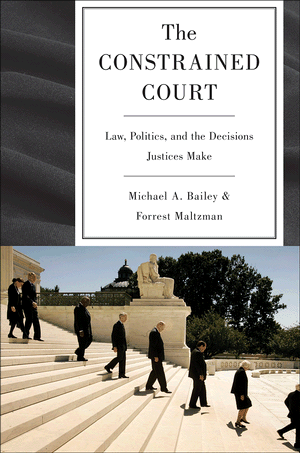
Obama’s landmark health care reform legislation was perhaps the most consequential social policy change in the U.S. in several decades.
And we now know that whether it will fully go into effect will depend on the views of the nine unelected, life-tenured justices of the Supreme Court.
After Bush v. Gore and Citizens United many Court observers have become jaded, viewing the Court’s actions simply as extensions of politics. This view has a strong pedigree in political science and, if it is correct, it’s pretty easy to predict what will happen to the health care law: down it goes. Four justices are solidly conservative and there is little doubt about their policy preferences. A fifth, Justice Kennedy, is a Republican appointee on the liberal end of the Republicans in Congress. He’s still pretty conservative and in a recent analysis, I’ve applied the model from The Constrained Court to estimate the policy preferences of justices and how they would map onto the vote on the health care legislation (it’s all based on a statistical model that links the Court and Congress via positions members of one institution take on votes in the other). This analysis indicates if Kennedy were voting on policy grounds only, he too would be a solid vote to overturn.
But is such analysis sufficient to predict the Court’s decision on the healthcare law or, more generally, to explain the Court? I think not. Just look at high profile cases such as when respect for precedent pushed Justice Rehnquist to defend Miranda rights, an anathema to the conservative movement from which he came. Loyalty to the First Amendment led Justice Scalia to defend flag-burners, despite his avowed desire to see them in jail.
A more accurate view is that justices do not simply implement their policy preferences, but instead act in a legal context in which legal values and norms also matter. Sometimes these non-policy factors matters more, sometimes less. And goodness knows legal values vary dramatically from justice to justice, but they do matter.
Hence I expect the Court will uphold the law. There is still room for conservatives on the Court to cause mischief (perhaps putting off consideration of the law and inducing uncertainty about it or perhaps upholding the law with a very narrow view of the Commerce Clause). But the bottom line is that even though probably a majority of the Court won’t necessarily like the law on policy grounds, their decision will revolve around more than policy. This is the essence of the Court: even as it is unavoidably political, legal constraints matter and push it to do things differently than the mini-legislature it is so often accused of being.
I’ll be discussing these and other themes in a discussion of my recently published book with Forrest Maltzman, The Constrained Court on Wednesday, February 23 at 5 pm at the Rothermere American Institute (1A South Parks Road). Please join us – for the talk and, if that’s not enough, for the wine afterward.
Michael Bailey is the Winant visiting professor of American government at the Rothermere American Institute.








No Comment